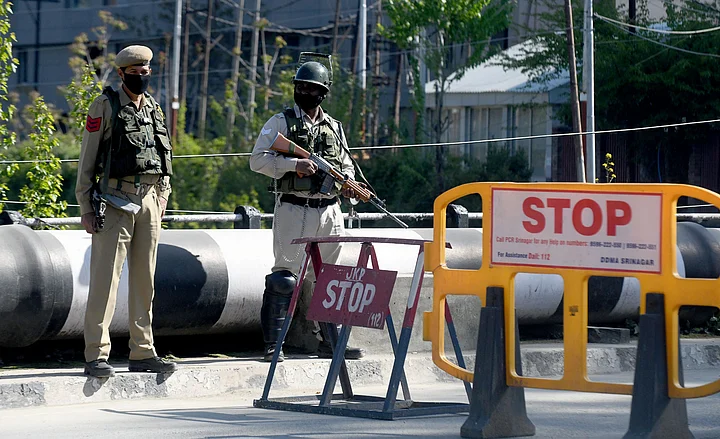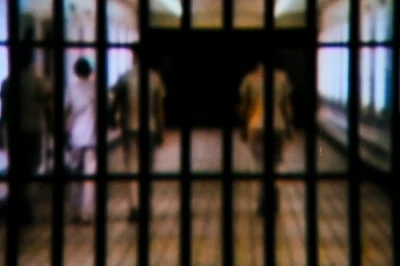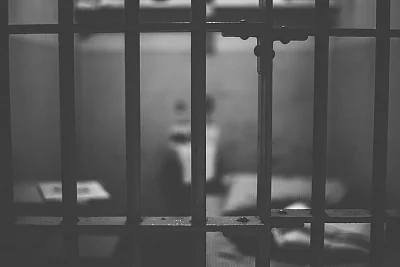The sudden death of senior Hurriyat leader Mohammad Ashraf Sehrai has raised concerns over the safety of other Kashmiri separatists and activists, many of whom were placed under preventive detention in the aftermath of the abrogation of Article 370 by the BJP’s central government.
Sehrai (77), one of Kashmir’s most senior politicians who famously contested Assembly elections against National Conference founder Sheikh Abdullah in 1977, passed away at a Jammu hospital on May 5.
His death came barely a year after his youngest son, Junaid, a management student who had joined militant outfit Hizbul Mujahideen, was killed in an encounter with security forces in the downtown area of Srinagar.
“We were in touch with him until around 10 days ago when he complained of being unwell. Yesterday, we got a call from the jail authorities that had been admitted to a hospital in Jammu. But we couldn’t reach there on time,” said Mujahid, his son.
Mujahid said that his family was not informed about his father’s ‘deteriorating’ health condition, “Some of our family members met him in February when he complained of not being well. He was diabetic and had other medical conditions, but he was not getting proper care,” he alleged.
DGP of Prisons Department VK Singh said Sehrai was lodged at Udhampur jail and given his old age and co-morbidities, he had asked the J&K Home Department to shift him to the Jammu jail, which has “better healthcare infrastructure”.
“There is a process to be followed for shifting prisoners, which could not be completed in his case,” Singh said.
Fear of More Deaths
Ashraf’s death, who was booked under the Public Safety Act last year after the killing of his militant son, has raised fears among hundreds of Kashmiri families whose kin are languishing in jails across the country.
Their fears have been exacerbated by the outbreak of COVID-19 that has infected hundreds of prisoners in the already overcrowded jails of the country.
According to the latest report of the National Crime Records Bureau, there are 4,78,600 inmates in different prisons of the country that have a collective capacity of only 4,03,700 inmates, making them most overcrowded since 2010.
The jails in Jammu and Kashmir are not any different. Against the cumulative capacity of 3,426 inmates, around 4,550 inmates are currently lodged there. According to official data, just two percent of the inmates lodged in J&K jails under militancy charges are convicted by courts.
Two prisoners died of COVID-19 in J&K, Singh said, while 542 were infected by the coronavirus (One of these deaths was reported in October 2020. The second is still unverified). “Barring the two prisoners, who had co-morbidities, the infected inmates have recovered,” Singh said.
Habeel Iqbal, lawyer and rights activist, said there were hundreds of Kashmiri detainees languishing in jails across the country who had been denied the relief of the Supreme Court order for releasing prisoners after the outbreak of COVID-19.
“Hundreds of persons have been detained merely on the basis of suspicion that they may commit some illegal act prejudicial to the public order or security of the state. Using the ambiguity of the SC order, they have been kept behind bars,”Habeel Iqbal
According to officials, around 300 persons have been released from jails in Jammu and Kashmir following the SC order. Most of these prisoners were released in March and April after the pandemic broke out. Some were released in May.
Yet, hundreds more continue to languish.
Overall, since last year, over 4,200 prisoners have been released on bail or parole. But only 300 of them were held under preventive detention or militancy charges.
On 31 December 2019, there were 3,689 prisoners in J&K’s jails. In December 2020, there were 4,131 prisoners.
Veil of Secrecy
A member of Ashraf’s family, who didn’t want to be named, said they were not informed about his condition. “When he was admitted to the hospital in Jammu, we were told that he had mild illness. But later we got to know that he had contracted COVID-19,” he said.
As the virus has succeeded in infiltrating prisons, infecting hundreds of inmates, the apathy of officials in Jammu and Kashmir has put the well-being of those languishing in the jails under a cloud of uncertainty.
When the news of Sehrai’s death broke on Wednesday, two daughters of Shahid-ul-Islam, a middle-rung moderate Hurriyat leader, wrote a letter to Union Home Minister Amit Shah, seeking his intervention in getting their father released from jail.
Shahid, who is the political advisor of moderate Hurriyat chief Mirwaiz Umar Farooq, was arrested by the National Investigation Agency in 2017 in a terror-funding case. He tested positive for COVID-19 last week.

Family sources told The Quint that they got to know about it through another inmate lodged with him in New Delhi’s Tihar jail when he phoned them about his “deteriorating” condition.
“He has been shifted to some undisclosed location and we have no contact with him. We do not even know if he is alive. Ashraf’s death has made us even more worried about the well-being of our father," his daughters wrote in the letter, which was circulated on social media.
Human rights activist Mohammad Ahsan Untoo, who was detained under PSA in 2019 and released last year from jail amid the first wave of COVID-19, said the condition of Srinagar’s Central Jail, where he was lodged, was “pathetic”.
“Dozens of inmates are lodged in a single barrack, which can accommodate just a few, making them more vulnerable to infection. Prisoners aren’t provided medicine, food or even drinking water on time,” Untoo said.

‘Bring Them Back’
Since her father’s detention in 2017 in the terror-funding case by the NIA, Sehar Shabir, daughter of senior Hurriyat leader Shabir Shah, has been using social media to seek her father’s release.
Shah is also reportedly languishing in Tihar, but his family has been unable to see or talk to him since January 2020 when he was taken to a hospital, his daughter said
“We have no information about him. If they won’t release my father, they can at least shift him to some jail in J&K till the pandemic is over. I am not asking this as the daughter of a Hurriyat leader. But this must be done for the sake of humanity,” said Sehar, a student.
Last week, the J&K High Court Bar Association had urged the government to shift Kashmiri prisoners back to the Kashmir Valley.
“Bar Association is expressing its deep concern about condition of Kashmiri prisoners lodged in jails outside. It is also appealed that the cases of these prisoners, detenues be reviewed for release on parole, keeping in view the gravity of the pandemic,” the Bar stated.
In a meeting chaired by Bar president Nazir Ahmad Ronga, the HC body asserted: “It was decided to appeal to the government of India and UT administration to review the cases of prisoners for release on parole and shifting of these prisoners to the nearest jails in Kashmir valley.”
The mounting piles of bodies of COVID victims across the country give sleepless nights to the families of Hurriyat leaders. Ruwa Shah, daughter of Altaf Ahmad Shah who is also incarcerated at Tihar jail, said an inmate in his father’s cell had tested positive for COVID-19.

“The worst part is that they don’t even reveal the information. We don’t even know whether my father is in isolation or he if had been tested after his cellmate was diagnosed positive for Covid,” she said.
“It is as if they are waiting for all of them to die,” she said
(At The Quint, we question everything. Play an active role in shaping our journalism by becoming a member today.)




